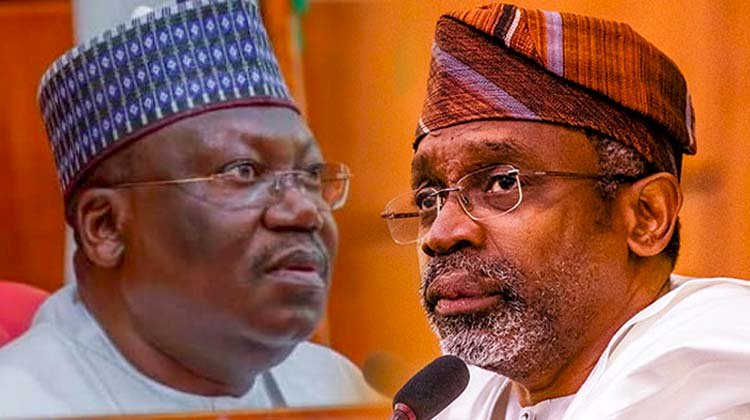National Assembly, Stop Approving Buhari’s loans

BRUSHING aside all calls for caution, the President, Major General Muhammadu Buhari (retd.), is seeking the approval of the National Assembly for yet another N819.54 billion domestic loan. Ostensibly, the supplementary budget he presented to justify the request is anchored on fixing the infrastructure destroyed by floods across the country. Buhari has taken too many loans; with only five months left for him to relinquish power, lawmakers should stop rubber-stamping his requests and plunging the country further into the debt trap.
In the letter attached to the supplementary budget read to senators by the President of the Senate, Ahmad Lawan, Buhari said it is meant for the capital expenditure component of the 2022 budget with an attendant increase of deficit to N8.17 trillion, and deficit-to-GDP ratio of 4.43 per cent. Should the NASS accede to this request, Nigeria’s domestic debt will rise to over N22 trillion.
The new borrowing will increase the Federal Government’s domestic borrowing in 2022 to N3.33 trillion. Addicted to debt, the size and frequency of Buhari’s borrowing is unprecedented in the country’s history. On his watch, total external debt rose from $10.32 billion in June 2015 to $40.06 billion by June 2022, an increase of $29.74 billion or 288.17 per cent. The Senate should act responsibly by subjecting this new request to very rigorous scrutiny. Unless it finds it crucial to national survival, it should be rejected.
Data from the Debt Management Office showed that the government’s domestic debt stock was N19.24 trillion by December 2021. By September 2022, it had risen to N21.55 trillion, an increase of 2.31 trillion in just nine months.
Nigeria is paying heavily for the inebriation. Interest charges on domestic debts will drain N4.5 trillion from the 2023 budget, an increase of 243.51 per cent from the N1.31 trillion proposed for this in 2016. Debt servicing consumed N16.6 trillion in the 16 months period, January 2021 to April 2022.
The Economist Intelligence Unit in July declared Nigeria’s revenue-to-debt service ratio as “the worst in the world” (January to April 2022), when up to 92 per cent of all revenue went into servicing debt. It is expected to reach 116 per cent in 2023, projects the IMF and on current trends, 160 per cent by 2027.
Successive Nigerian governments had a bad track record with debt, but the Buhari regime is by far the worst. Paradoxically, he came into office promising fiscal discipline and a departure from profligacy. Like many of his promises, he has failed to deliver.
Though development economists advise caution, there is a consensus that if carefully applied and a balanced debt-to-GDP ratio is maintained, borrowing can propel an economy by drawing funds to critical infrastructure, technology, human capital and other development projects. But studies have shown that above a certain threshold and improperly channelled, “high levels of public debt have a negative impact on economic growth,” declared the Cato Institute, a think tank.
Nigeria falls into that sorry category. Many cannot see the impact of the huge debt; infrastructure projects are few and excruciatingly slow in delivery. The infrastructure deficit has been increasing, not decreasing, and requires about $80 billion annually for 10 straight years to fix, estimates Waheed Olagunju, a former acting CEO of the Bank of Industry, higher than the $10 billion annually estimated by the World Bank in 2004/05.
Abandoned and uncompleted projects are everywhere. The Lagos-Ibadan Expressway, reconstruction of Port Harcourt-Maiduguri Rail Line, which links the South-East states to a planned new seaport in Bonny, and to Northern Nigeria; and many others remain in limbo five months to the end of this regime. The Second Niger Bridge it opened two weeks ago is not fully completed, with heavy duty trucks barred from using it. The access roads to the Apapa Ports Complex that handle 65 per cent of Nigeria’s maritime trade are a disgrace. This raises questions about the purpose and utility of the loans.
Elsewhere, the parliament maintains strict oversight over the public treasury, ensuring that every kobo is accounted for and put to judicious use in the interest of the public. But the NASS under Lawan and House of Representatives Speaker, Femi Gbajabiamila, rubber stamp every loan request by Buhari without rigorously scrutinising the details, purpose, or demanding explanations on how the past loans were utilised. This shameful acquiescence has sentenced the country to debt peonage, robbed Nigerians of the benefits of public revenue, and deepened poverty.
The United States Congress has broad oversight over government’s finances. As the representatives of the people, lawmakers exercise ultimate authority over public funds—not the executive branch. In India, the parliament sets the standards to coordinate and control the budget process; records and measures current financial performance; makes comparisons between actual and budgeted results and takes appropriate corrective action as required. Nigerian lawmakers should similarly be alive to their responsibility of being the gatekeepers of the public treasury.
Countries do borrow to supplement other revenue sources, provide infrastructure, social services, and budget support, but it is done wisely. Ghana recently announced that it was restructuring its foreign debts, a clear sign of financial distress and after downgrades by multiple credit ratings agencies. Nigeria must avoid this fate.
Buhari’s reckless debt acquisition amid low public revenue is not sustainable and has serious negative long-term implications. Unproductive national debt lowers national savings and income. It ignites higher interest payments, leading to large tax hikes and spending cuts, and poses a greater risk of a fiscal crisis.
To raise revenue, the government should liberalise the operating business environment and privatise state commercial assets instead of perpetually borrowing to fund capital-intensive infrastructure like ports, airports, railways, and oil and gas projects.
Loans should be taken only for viable infrastructure projects that can repay their way, stimulate production, and create jobs. The government should improve its tax system, recover all its outstanding revenue, block all revenue leakages and crush corruption.
Federal lawmakers should stop colluding with Buhari to entrench debt peonage and poverty.
PUNCH

 TSOEDE TV
TSOEDE TV 












